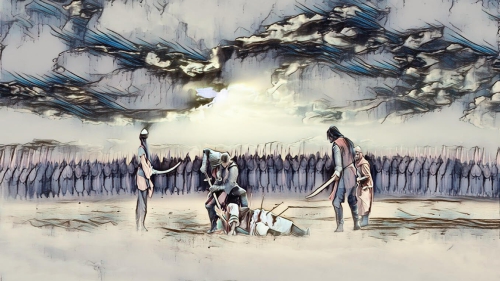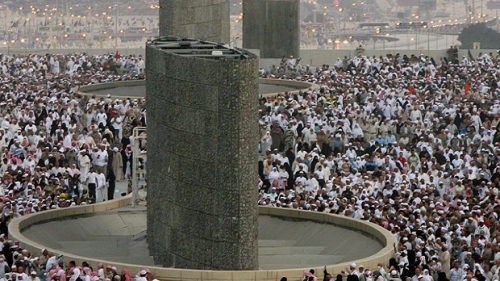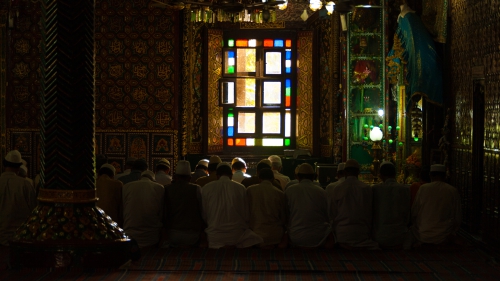Modern Primitiveness or Primitive Modernity

According to the worldview of agnosticism, certainty and knowledge are impossible and we will never be able to know the true reality. A constant skeptical approach to epistemology, thus, ought to be a norm. Exemplifying somewhat this doctrine, Albert Einstein once remarked: “I don’t try to imagine a personal god; it suffices to stand in awe at the structure of the world, insofar as it allows our inadequate senses to appreciate it.”
However, one wonders if agnostic thought, which originated most likely in ancient Greece in the form of skepticism, was a premeditated philosophical choice or a desperate reactionary re-positioning against the inability of established religions to provide a sense of both epistemological and spiritual certitude. The latter seems to be the case, in that the majority of agnostic views and tenets exude opposition and aversion, rather than a homogeneous system of thought and action. The sentiment is sufficiently epitomized by the words of Thomas Henry Huxley (d. 1895), a famous English biologist and evolutionist: “Agnosticism simply means that a man shall not say he knows or believes that for which he has no grounds for professing to believe.”
In reality, the problem was never agnosticism as such, or merely subscribing to the notion that nothing can be known of the existence or nature of God or of anything beyond material phenomena. Agnosticism was just an effect, the root causes of which were certain deficient religious creeds and their people whose intellectual as well as spiritual impulses were not entirely fulfilled.
Hence, the problem was official religions and ideologies. They were the culprits; people were the victims. Such terms as agnosticism, disbelief and skepticism might have been at first a derogatory portrayal by the former of those restless souls who never stopped exposing religions’ inadequacies and inability to solve their endless queries and curiosities. However, such was the situation that agnostics took the matter in stride, preferring creative or ontological ignorance over dogmatic and unproven – yet often outright flawed -- knowledge and wisdom. While the former, to some extent, invigorated and enriched, the latter completely inhibited and withered. This, surely, induced Clarence Seward Darrow (d. 1938), an American lawyer and leading member of the American Civil Liberties Union, to assert: “I do not consider it an insult, but rather a compliment to be called an agnostic. I do not pretend to know where many ignorant men are sure -- that is all that agnosticism means.”
The peril of agnosticism
Accordingly, the more the role of religions weakened and its limitations and failings became wide-open, the stronger the voices of agnosticism became and its followers increased. So much so that it has been estimated that in 2010, the agnostics made up about 9.6% of the world's population. In some especially Western countries, the rate was as high as between 30 and 35%.
This predicament, indeed, is alarming, and it is not set to recede anytime soon, never mind come to an end. As a result, people are increasingly feeling at ease with the grave prospect of living and dying without knowing about and experiencing metaphysical truths. But we all know that such truths are out there. If not, we would not search for them. As a matter of fact, every person’s life pattern -- regardless of what it may seem outwardly -- is a quest for the meaning and purpose of life. It is a journey of (self)discovery. People cannot function differently, as they have been thus fashioned and “programmed”.
Existing and operating in the name of science and invention, and powered by such ideas as absolute intellectual and spiritual freedom and self-determination, agnosticism never stopped appealing to the religious and intellectual dissenters. Since there was never a serious answer to the advances of agnosticism – which further amalgamated itself, partly or completely, with the ethos of almost all recent and current Western secular ideologies and worldviews – the damage was extensive and seemed irreparable, becoming a phenomenon of global proportions.
The limited temporal benefits generated by agnostic thought is negligible when compared with the magnitude of the actual civilizational damages it accrued over centuries. What is more, the former is often resorted to and greatly exaggerated in order to mitigate or conceal completely the harm of the latter and its severity. It is used as blinders, or a smoke screen.
This explains why people in the era of enlightenment, reason, reawakening, modernity and science still seem comfortable with their state of not knowing the answers to the most fundamental questions which, when all is said and done, signify a dividing line between civilization and primitiveness or backwardness, and between knowledge and ignorance. That people, despite their existence on the face of the earth for thousands of years, discuss ad infinitum, failing to fully understand and appreciate, for example, the origins, meaning and purpose of life, the origins, purpose and mission of man as a species, the meaning and purpose of death, human rights, human cultural and ethnic diversity, the role of woman, marriage and family, the universe, outer space, the idea of metaphysics or the fundamental nature of reality, etc. – all these denote serious stains on the quality and integrity of modern materialistic civilization.
In other words, man remains an ignorant and, at the same time, arrogant being. The basic truths about himself and all the other physical and metaphysical realities around him, he fails to comprehend and forge sound relationships with. And he seems happy to go on with the status quo indefinitely. No wonder ignorance about the truth crept into virtually every aspect of human existence, ostensibly counterbalanced by trifling and inherently short-lived gains in the oscillating realms of science, innovation and technology.
Man is increasingly becoming his own slave. He deifies nothing and nobody except his very self and his material achievements, for everything else is either unknown or utterly unknowable. His cerebral capacities alone stand out as the point of reference for evaluating successes and failures. Accordingly, issues and problems of special importance for mankind are never thoroughly solved because people are bogged down in frivolous and unnecessary concerns and debates. Trapped in the fetters of his raging ego, animal desires and at once confused and discontented intuition and conscious mind, man thus fails to rise and explore life from elevated vantage points.
What is genuine civilization?
One wonders, therefore, if those failings are the hallmarks of civilization or the attributes of primitiveness, or if we live today in the age of modern primitiveness or primitive modernity. This is so because genuine civilization is not solely about complex societies characterized by remarkable material progress in such fields as urban development, social stratification, symbolic communication forms, specialization of labour, monumental architecture and other advanced socio-political-economic factors and features. Rather, genuine civilization is about people’s total wellbeing and happiness, as well as about creating a total and lasting legacy that will attest to people’s realization of their existential purpose and successful accomplishment of their life mission. Material progress is secondary, playing second fiddle to the true spirit of civilization. It is but a means, a carrier and a physical locus of the latter.
Civilization, it goes without saying, ought not to be only about matter or physics, for obviously life is more complex, multidimensional and so, more consequential than that. In the same vein, civilization should represent a result of people’s comprehension and recognition of the truth and their living it. Anything short of that suggests a level, or a state, of backwardness and primitiveness, regardless of how and in which wrapping such a level, or a state, might be presented.
Civilization, furthermore, is not about endorsing and advancing ontological ignorance, disorientation and confusion, swathing them in appealing and ostentatious scientific jargon. Nor is it about cleverly asking questions, while knowing that answers are not forthcoming, exacerbating in the process people’s existential anxieties and dilemmas. Instead, civilization is about providing answers and dispelling people’s perennial fears and uncertainties, while at the same time ensuring their spiritual, intellectual, social, ethical and material well being. This is to be accomplished by realizing and delivering appropriate means of subsistence, types of livelihood, settlement patterns, forms of government, social and economic systems, education, and other necessary life systems and cultural traits.
People need to know in order to act and create. Only certitude and confidence can breed authentic civilization and refined cultures. Doubt and confusion, on the other hand, breed only dissent, dissonance and conflicts of all kinds and at all levels of human existence. Only a knowing man is a civilized and cultured man, disposed to recognize, create, appreciate and sustain. An enduringly skeptical and unknowing man is the polar opposite of the former, bent more on the manipulating, depleting and outright destroying of life and its constituents as well as resources in the name of his myopic interpretations of civilization, cultural refinement and progress. A knowing man is civilization’s (earth’s) asset; an unknowing man is its liability.
Islam’s response
On account of it being a natural, pragmatic and rational religion (code of life), Islam recognized the magnitude of the conundrums posed by the proponents of agnosticism and its derivatives, facing them head-on. Islam knew that the problem lay in people and their epistemological sources and methods. The problem was with-in, rather than without.
As a result, Islam’s remedial measures focused much of their attention on the arousal and purification of human mind and soul. Man is constantly taught about himself, his noble purpose and calling as God’s vicegerent on earth, his rights and responsibilities towards his self and other life realities, his place and role in the universe, his physical, spiritual and mental capacities and strengths, etc. Man is thus taught to be fair and just, most of all, to himself, than to others, for the latter is impossible without the former. He is also taught to come to terms by means of his gifts and faculties with the undeniable verity that absolutely nothing in life is without a purpose, so to claim that the entire phenomenon of life is meaningless and purposeless would be grossly absurd and illogical. Similarly, everything in life functions perfectly and in accordance with the highest standards of unity, harmony and equilibrium, so to claim that the whole of existence originated and subsists as a result of a series of coincidences would be as irrational and strange.
Man, by definition, is an intelligent and inquisitive being created but to learn and know. Every day and moment, and in every situation, he is to discover and learn something new. His fleeting stay on earth is but a journey of self-realization, development and enrichment. It is by all means implausible to have such a restless and curious being living and operating in the unknown and the unknowable. Such a situation would defeat the whole purpose of existence and the meaning and purpose of man himself and everything he strives for. Even saying that positively knowing about the existence of God and the supernatural might one day come to pass -- even in some measure only -- is nothing but an archaic cliche, or a form of philosophical escapism, in that thousands of years have elapsed and thousands of great minds and a lot of scientific effort have been “wasted” only to hear again and again that we live in the unknown and the unknowable. What is going to make the future scientists, philosophers and their voluminous scientific efforts fare any better? While humankind might be running out of time, two wrongs will never make a right.
Indeed, reasoning that the ultimate truths are either unknown or unknowable represents such a huge mismatch between the innate character and ambitions of man and his life undertakings and general challenges that it appears as though an insult to his remarkably unique self and identity. It leaves man bereft of any genuinely meaningful sense and value he could authenticate and sustain his temporary life with. The matter, in actual fact, is almost on a par with such hypothetical mismatches or absurdities as, for instance, man living in water and fish on land, or as man living on another planet and someone, or something, else replacing him on earth. The latter examples are deemed absurd and far-fetched because they violate the basic laws of existence. The notion of agnosticism is seen in the same light, too, as it also contravenes some of the most basic paradigms of life.
Islam, therefore, made compulsory the enterprise of knowledge seeking, for both men and women, and from the cradle to the grave. Seeking knowledge brings a person closer to God and renders his admission into paradise (jannah) much easier. Knowledge is associated with light, piety, peace, happiness and success in both worlds. Ignorance, doubt and uncertainty, conversely, are regarded as the sources of every misfortune and failure. Allah declares in the Qur’an that only His knowledgeable servants truly fear Him (Fatir, 28), and that those who know and those who do not are not equal, but “Only they will remember (who are) people of understanding” (al-Zumar, 9). The inhabitants of hell will say on the Day of Judgment, emphasizing the substance of the earthly life and its relationship with the Hereafter: “Had we but listened or used our intelligence we should not (now) be among the Companions of the Blazing Fire!” (al-Mulk, 10).
The Prophet (pbuh) summed up the Islamic view of knowledge and the importance of its seeking as follows: “If anyone travels on a road in search of knowledge, Allah will cause him to travel on one of the roads of paradise. The angels will lower their wings in their great pleasure with one who seeks knowledge, the inhabitants of the heavens and the earth and the fish in the deep waters will ask forgiveness for the learned man. The superiority of the learned man over the devout is like that of the moon, on the night when it is full, over the rest of the stars. The learned are the heirs of the Prophets, and the Prophets leave neither dinar nor dirham, leaving only knowledge, and he who takes it takes an abundant portion” (Sunan Abi Dawud, Book of Knowledge, Hadith No. 1)
Islam made the knowledge of the ultimate truths both readily available and attainable. That is done by means of utilizing intuition, the five senses, reason, the natural or physical world, and revelation. The key is the revealed knowledge which realigns and guides the other four epistemological sources. It also awakens and nourishes in man his spiritual dimension. It sets him free from the shackles of the physical world and propels him to the unprecedented stations and viewpoints whence he could behold the life wonder in its truest multidimensional physical and metaphysical light.
Since its inception, Islam as a guidance based on the human primordial nature and reason, declared a war against falsehood, ignorance, blind following even in sheer religious matters, deliberate mediocrity, apathy and intellectual indolence. Anything that promoted or facilitated such spiritual and mental disorders was as sternly proscribed. It stands to reason that Islam as a comprehensive worldview and way of life is virtually synonymous with true knowledge and genuine civilization. What is more, it is their solitary cause. It is only when there is Islam, both in the realm of ideas and thought and in the world of human experiences and palpable realities, that there will be authentic knowledge and genuine civilization. It its absence, there could only be fiction, or at best, some fragmented and ephemeral triumphs.
Revelation – which proves its own heavenly origin and authenticity -- gives man a true empowerment and uplifting. It opens his eyes, mind and soul, enabling him to rise above the stifling obstacles of skepticism, doubt and uncertainty -- which are fueled and sustained by the state of man’s being trapped within the vicissitudes of the material world -- and behold as well as read Allah’s incalculable signs in the universe which are as manifest in the smallest as in the grandest. The truth is deposited everywhere, but only the right guidance, means and equipment can unearth it.
In other words, man’s ego, spiritual illiteracy and blindness are taken care of most. Man is convinced thereby that he must and can know, and as God’s vicegerent on earth, he is meant and facilitated but to do so. It is all down to man and how much he is willing and ready to know. Such is the nature of the knowledge of the transcendent realm of existence that, in the end, man will get only as much as he honestly wanted and was ready for. Referring to this powerful truth, Allah says: “So have they not travelled through the earth and have hearts by which to reason and ears by which to hear? For indeed, it is not eyes that are blinded, but blinded are the hearts which are within the breasts” (al-Hajj, 46).
Also: “And certainly We have created for hell many of the jinn and the men; they have hearts with which they do not understand, and they have eyes with which they do not see, and they have ears with which they do not hear; they are as cattle, nay, they are in worse errors; these are the heedless ones” (al-A’raf, 179).
It is only relatively true that life is what we make it, or that life is what we think it is. Absolutely speaking, life is not what we make it out to be; life is what the Creator of life, and of us, says it is. We are not to live life according to our own will and whim, but according to the will and word of the Creator of the universe and life. It is only when our will and the will of our Creator and Master concur that the veils concealing the ultimate realities and truth start falling. The life of true believers is all about removing those veils and constantly growing in knowledge, wisdom and grace.
It follows that agnosticism should be countered and remedied by discovering and learning about the self, first and foremost. This is so because only by completely knowing himself, man can know other transcendent realities of life -- including God. Only when there is epistemological and spiritual peace between man and his very self, there can be peace between him and the rest of life constituents. Man is a microcosm of the ultimate truth. If he really wants to find it, he need not go far.
Views: 1464
Related Suggestions

















